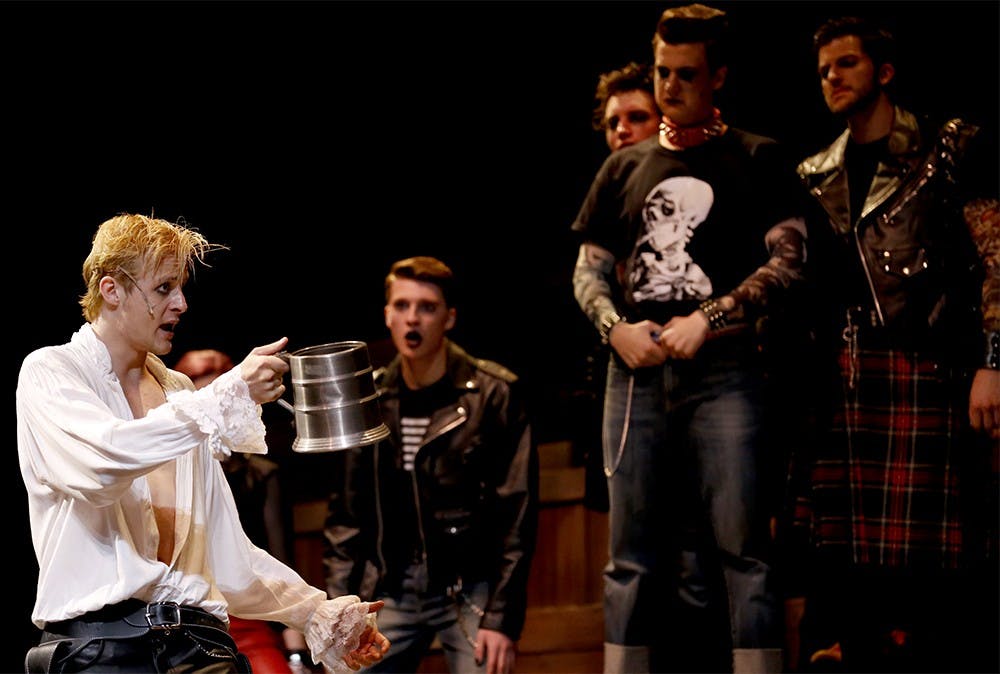Andrew Jackson never wore black eyeliner or skinny jeans. Born into a farming family in the late 1700s, Jackson was a rough and tough frontiersman.
IU Theatre’s production of the musical “Bloody, Bloody Andrew Jackson,” opening Friday, puts the seventh president of the United States onstage as a punk rock star, complete with a white shirt slashed to his navel and disheveled hair.
Jackson, played by junior Robert Toms, croons and shouts to local band the Phunk Nasty’s, while the rest of the cast wears leather corsets, studded belts and dark lipstick.
“We want to make this not just pure entertainment,” production dramaturg Brennan Murphy said. “People will be out there glammed out in makeup, high heels and fishnet stockings — it’s going to be phenomenal, it’s going to be crazy — but we also want audiences to connect with it on a deeper level and try to understand the politics that we see today.”
Murphy’s job is to research and review the content of the show to ensure its historical accuracy.
Once he had a firm idea of Jackson’s life, he and the rest of the production team began to draw parallels between Jackson’s campaign and the presidential race today.
When “Bloody, Bloody” first premiered on Broadway in 2010, it was a political commentary on George W. Bush’s presidency and the rise of the Tea Party.
Now, IU Theatre has used it as a means to convey a political statement about Donald Trump.
“Andrew Jackson’s campaigns for president in the 1820s were some of the first major examples of political mudslinging in this country on such a grand scale,” Murphy said.
The political badmouthing was happening on both sides. John Quincy Adams, running against Jackson, created and distributed a series of pamphlets called “The Coffin Handbills” to attack Jackson’s character.
Despite all of the negative messages circulating about Jackson, he was elected. During his time in office, Jackson was responsible for the Trail of Tears and the destruction of the national bank, which caused an enormous recession left to Martin Van Buren after Jackson’s presidency ended.
The words “Bloody, Bloody” describe Jackson’s approach to almost every aspect of life, Murphy said.
Before his presidency, he was a famed general and was called “Old Hickory” because of his unbending sentiments, positive or negative.
“In some ways, that can make a great figure, a man who will stick to his ideals,” Murphy said. “However, that allowed him to first ally with Native American groups and then to brutally massacre and turn upon them. I really wish that he had the capacity to change.”
Americans fell in love with him because of his populist ideals, Murphy said.
He seemed like a bad boy, a revolutionary who would change the existing government, so the punk rock portrayal is fitting.
When Jackson became president, however, he became a megalomaniac who ignored his cabinet, Congress and the Supreme Court, Murphy said.
Jackson’s followers had been attracted to his charisma, but charisma is incredibly dangerous in the hands of a warped individual like Jackson.
“We must be fully aware of when our love of a charismatic individual is drawing us down a bad path,” Murphy said. “Our patriotism or our ideals can make us compromise our basic human instincts.”
Video clips of presidential candidates like Trump are projected onto the set as a form of warning, projection designer Reuben Lucas said.
The added video projections were not included in the original musical, but they serve as a way to make the show relevant to the present political atmosphere, lighting designer Carrie Barton said.
“It’s going to shock a lot of people, and they are going to have a realization once they see it to its fullest,” Barton said. “The fact that the story, hundreds of years later, still is relevant in America where we’ve been fighting for this not to be an issue anymore, that’s what’s going to resonate with people.”






